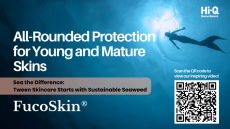‘Incredible response’: SUGAR Cosmetics unlocking untapped potential in India’s developing cities

SUGAR Cosmetics first launched in 2015 as a D2C online beauty brand, before adopting an omnichannel strategy in 2017. Over the next two years, it grew a presence in over 2,500 retail outlets.
The brand recently opened its 200th standalone store, and is currently available at retail outlets across more than 550 cities.
While opportunities abound in metropolitan cities, it is the “untapped potential” in the smaller developing cities, where interest for makeup is growing rapidly, that could fuel the firm’s next phase of expansion.
“Despite competitors rescinding plans of opening new stores and even closing existing ones since the pandemic, SUGAR has continued to strengthen our retail presence in the domestic market.
“This strategy has allowed us to establish our brand in various locations, even in Tier 2 and 3 markets, such as Jalandhar, Surat and Nagpur, where we’ve witnessed incredible response. These areas have an expanding consumer base, rising disposable incomes, and a desire for easily accessible beauty products,” Vineeta Singh, co-founder and CEO of SUGAR Cosmetics, told CosmeticsDesign-Asia.
According to Singh, 60% of SUGAR’s business comes from outside Tier I cities in India, while the share of international markets stands at about 10%.
“We have been able to achieve a 90% growth in revenue over the last two fiscal years and also improve our bottom line by nearly 15% in FY23. This success can be attributed to our focus on cost management and operational efficiency.
“India will always be our major market. We plan to expand our distribution channels and increase our retail presence to over 100,000 outlets across the country.”
At the same time, SUGAR intends to set foot into more overseas markets and establish itself as an internationally recognised beauty brand.
Its approach includes studying global trends, introducing localised content, and adding more products to its portfolio of more than 550 SKUs.
“Our aim is to maintain above-market growth and break even by the end of the fiscal year. This will enable us to invest in building brand awareness, fostering strategic partnerships, as well as enhancing our operations, research and product development, and customer experiences without having to rely on external capital,” Singh added.
Targeting the Gen Zs
In India, consumers still show a strong preference for shopping in physical stores for cosmetics.
“They can see, touch, and test the products before making a purchase. This sensory experience provides reassurance and helps build trust in a product’s quality, authenticity and efficacy.
“Although many brands faced difficulties during the pandemic, we were fortunate enough to achieve a 50% increase in revenue over our pre-COVID high. Out of 500,000 SUGAR products sold, nearly 50% were purchased offline.”
However, Singh noted that the online retail landscape is growing fast in the country, with e-commerce platforms gaining popularity, especially among younger consumers who value convenience and a wider product selection.
In fact, the millennials and Gen Zs have been identified as SUGAR’s target audience due to their “increasing purchasing capability, proactive adoption of trends, and active engagement on social media platforms”.
“Young adults aged between 18 and 27 years old have consistently showed immense interest in our cosmetics products. Moreover, this group of consumers have a strong inclination towards making decisions influenced by their peers.
“Over the next five years, Gen Zs are expected to become the primary consumer base for most brands in the beauty and personal care category. Their substantial spending power and influence in the market will shape industry trends and impact brand strategies.”
![L’Oréal Professional has launched Redken in India to fulfil the growing demand for specialised solutions. [Redken]](/var/wrbm_gb_food_pharma/storage/images/_aliases/wrbm_medium/publications/cosmetics/cosmeticsdesign-asia.com/headlines/business-financial/l-oreal-bets-on-redken-to-satisfy-indian-consumers-need-for-individualisation-and-experimentation/16670996-1-eng-GB/L-Oreal-bets-on-Redken-to-satisfy-Indian-consumers-need-for-individualisation-and-experimentation.jpg)
![[Grown Alchemist]](/var/wrbm_gb_food_pharma/storage/images/_aliases/wrbm_medium/publications/cosmetics/cosmeticsdesign-asia.com/headlines/market-trends/what-s-trending-the-most-read-stories-on-apac-beauty-market-and-consumer-insights21/16671137-1-eng-GB/What-s-trending-The-most-read-stories-on-APAC-beauty-market-and-consumer-insights.jpg)
![ASW is aiming to return to its pre-COVID form of expanding its brick-and-mortar network by 1,000 stores a year. [A.S. Watson]](/var/wrbm_gb_food_pharma/storage/images/_aliases/wrbm_medium/publications/cosmetics/cosmeticsdesign-asia.com/headlines/business-financial/a.s.-watson-aims-to-open-1-000-stores-a-year-as-market-returns-to-normality/16648547-1-eng-GB/A.S.-Watson-aims-to-open-1-000-stores-a-year-as-market-returns-to-normality.jpg)
![[Dr. Ci:Labo]](/var/wrbm_gb_food_pharma/storage/images/_aliases/wrbm_medium/publications/cosmetics/cosmeticsdesign-asia.com/article/2023/08/11/brand-story-updates-from-coty-l-occitane-pond-s-and-more-top-beauty-brands/16648352-1-eng-GB/Brand-story-Updates-from-Coty-L-Occitane-Pond-s-and-more-top-beauty-brands.jpg)















